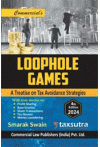- Author(s): Smarak Swain
- Publisher: Commercial Law Publishers (India) Pvt Ltd
- Edition: 4 Ed 2024
- ISBN 13 9789356037519
- Approx. Pages 372 + Contents
- Format Hardbound
- Approx. Product Size 24 x 16 cms
- Delivery Time 3-5 working days (within Kerala & South India) (Others 7-9 days)
- Shipping Charge Extra (see Shopping Cart)
...................................................................................................................................................................................................................................
Description
With true stories on:
• Profit Shifting
• Base Erosion
• Sham Transactions
• Tax Heavens
• Money Laundering
Taxation is the single most important channel to bringing about wealth redistribution in a society. Taxation is also distortionary, in the sense that it distorts free market exchanges. Tax policy is usually about treading the thin line between equity and efficiency. An efficient tax system causes least friction in the conduct of business, while an equitable one manages to tax the rich and share the riches with the commons. There are complex trade- offs between equity and efficiency, due to which tax laws are complex and can appear unwieldy to the uninitiated. Complexity of tax laws leads to significant arbitrage on simple questions of interpretation, and also significant scope of gaming. This book was written originally to highlight the gaps in tax laws that are often exploited for aggressive tax planning as well as for tax avoidance. I am happy to note that many of the loopholes discussed in the first edition of this book have been plugged in successive budgets. Many other loopholes have been 'contained' by multilateral effort of many countries which have been equally affected by base erosion and profit shifting from their respective jurisdictions. Corporate structuring has become even more challenging as new anti- abuse provisions have been introduced in domestic and treaty laws. At the same time, new loopholes are arising due to pressure on countries to give tax incentives for promoting business. Differential tax rates, for different types of income, and for same type of income in different industries, are creating new avenues of avoidance.
......................................................................................................................................................................................................................................
Contents
Preface
About the Author
Detailed Content
Introduction: "Don't be Evil"
Part I : Profit Suppression
Chapter 1 Deferral of Revenue
Chapter 2 Exploiting the Mercantile System of Accounting
Chapter 3 Manipulating Segmental Accounts
Chapter 4 SPV and JDA Structures
Chapter 5 Characterisation of Revenue as Capital Receipt
Chapter 6 Rate Arbitrage
Part II : Gain Suppression
Chapter 7 Avoiding Tax through Capital Receipts
Chapter 8 Capital Loss Harvesting
Chapter 9 Structuring through Non-complete Fees
Chapter 10 Bonus Stripping
Part III : Profit Shifting
Chapter 11 Intra-Group Services
Chapter 12 Thin Capitalisation
Chapter 13 IP Migration Strategies
Chapter 14 Cost Sharing Arrangements Used for Tax Avoidance
Chapter 15 Restructuring into a Contract Manufacturer
Chapter 16 Structuring Sourcing and Procurement Activities
Chapter 17 The Dummy's Guide to Structuring
Part IV : Base Erosion
Chapter 18 Permanent Establishment Manipulations
Chapter 19 Taxing the Cloud
Chapter 20 Structuring of OTT Business
Chapter 21 Circumventing the Equalisation Levy
Chapter 22 Migrating HNWIs and Professionals
Part V : Sham Transactions
Chapter 23 Use of Third Party Intermediaries
Chapter 24 Colouring Loans as Finance Lease
Chapter 25 Employer-Employee Collusion
Chapter 26 Tax Avoidance through Merger & Acquisition
Chapter 27 Saving Dividend Distribution Tax
Chapter 28 More Sham Charecterisations
Part VI : Trends in Blatant Evasion
Chapter 29 Shell Companies
Chapter 30 Tax Evasion through Stock Exchanges
Chapter 31 Under-Invoicing & Over-Invoicing
Chapter 32 Hawala
Chapter 33 Tax Havens
Chapter 34 Exchange of Tax Informations
............................................................................................................................................................................................................................
Author Details
Smarak Swain graduated in Electrical Engineering from Indian Institute of Technology, Kharagpur in 2006, and joined the Indian Revenue Services (IRS) in 2008. He has also done Masters in Taxation and Business Laws (MTBL) from NALSAR University, Hyderbad.
In the Income Tax Department, he has experience in the fields of corporate and business assessments, tax administration of charitable and religious trusts, investigation, and transfer pricing. He has authored four works of non-fiction and a since fiction, including the book Tangible Guide to Intangibles: Identification, Valuation, Taxation & Transfer Pricing. International law, financial forensics, and geo-economics are his primary areas of interest. He can be contacted at: smaarak@gmail.com

